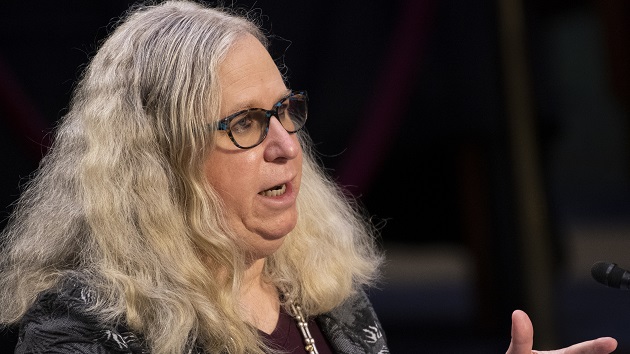
Caroline Brehman/CQ-Roll Call, Inc via Getty Images
Caroline Brehman/CQ-Roll Call, Inc via Getty ImagesBy CHEYENNEHASLETT, ABC News
(WASHINGTON) — At a historic hearing Thursday, Rachel Levine, President Joe Biden’s nominee for assistant secretary of health at the Department of Health and Human Services, and the first openly transgender person nominated for federal office, told lawmakers she would fight to improve health care access for all Americans if confirmed and deflected inflammatory questions from a GOP senator who likened transgender surgery to “genital mutilation.”
As the HHS assistant secretary of health, Levine would oversee the nation’s public health system amid the pandemic. A pediatrician, she recently led Pennsylvania’s pandemic response as the state’s health secretary and was the state’s physician general before that.
She faced questions before the Senate Health committee for about two-and-a-half hours, alongside Surgeon General nominee Vivek Murthy.
Just over an hour in, Republican Sen. Rand Paul of Kentucky began questioning Levine about “genital mutilation” of children, which he compared to a person’s decision to transition.
“American culture is now normalizing the idea that minors can be given hormones about their biological development and their secondary sexual characteristics,” Paul said.
He repeatedly asked Levine if she believed minors should be able to make decisions to “amputate their breasts or amputate their genitalia” and if she supports the government “intervening to override the parents’ consent to give a child puberty blockers, cross-sex hormones and/or amputation surgery of breasts and genitalia.”
Levine responded politely that she would like to work with his office to talk about the complexities of transgender medicine. She deflected his misrepresentation of transgender surgery as “genital mutilation,” which is defined by the World Health Organization as torturous and inhuman treatment most commonly done in Africa, the Middle East and Asia often aimed at controlling women’s sexuality, enforcing premarital virginity and attempting to keep women “modest.”
“Thank you for your interest in this question,” Levine said. “Transgender medicine is a very complex and nuanced field with robust research and standards of care that have been developed. And if I’m fortunate enough to be confirmed as the assistant secretary of health I look forward to working with you and your office and coming to your office and discussing the particulars of the standards of care for transgender medicine.”
Paul said she “evaded the question” and asked again, weaving in an anecdote about 23-year-old Keira Bell in the U.K., who recently took legal action against that country’s public health system, the NHS, for not challenging her decision to transition when she began treatment at 16 years old. Bell argued she was not competent to make that choice as a teenager and now regrets it.
“Will you make a more firm decision on whether or not minors should be involved in these decisions?” Paul asked Levine.
Levine again told Paul that there was not a blanket answer to his question, but that she would be happy to meet with him to explain all the different circumstances, decisions and research that goes into transgender health care.
“Senator, transgender medicine is a very complex and nuanced field and if confirmed to the position of assistant secretary of health, I would certainly be pleased to come to your office and to talk with you and your staff about the standards of care and the complexity of this field,” Levine said.
“Let it go into the record that the witness refused to answer the question,” Paul said.
Later in the hearing, the committee chair, Democratic Sen. Patty Murray of Washington, thanked Levine for her medical response to what she called Paul’s “harmful misrepresentations” and denounced the senator for being disrespectful to the nominee.
“It is really critical to me that our nominees be treated with respect and that our questions focus on their qualifications and the work ahead of us, rather than ideological and harmful misrepresentations like those we heard from Senator Paul earlier, and I will focus on that as chair of this committee. So thank you again for your response,” Murray said to Levine.
Democratic Sen. Tina Smith of Minnesota also defended Levine.
“We need advocates at all levels to make sure that we address that inequity and we fight against discrimination and ensure that everybody, all patients, have access to care, especially amid this crisis which has revealed so many inequities. So I wanted to thank you,” she told Levine.
Levine answered other questions at the hearing, mostly on her role as chief doctor for Pennsylvania during pandemic, her views on getting kids back into schools, the opioid epidemic and LGBTQ+ health equity.
“At its core, my career has been about helping people live healthy lives. As the assistant secretary for health, I would be committed every day to helping the people of our nation and improving our public health. I am both humbled by the opportunity, and ready for the job,” Levine said in her opening statement.
Levine detailed her tenure in pediatrics and adolescent medicine at Mt. Sinai and Lenox Hill Hospital before moving to Pennsylvania, where she worked for Penn State College of Medicine and focused on helping teenagers with medical and psychological problems. She was named physician general of Pennsylvania in 2015, confirmed unanimously to the post, and confirmed twice more by a bipartisan Pennsylvanias State Senate to be secretary of health.
“Of course, our focus changed dramatically last year, and COVID-19 became my urgent and primary focus,” Levine said. “There is still so much more to do.”
Copyright © 2021, ABC Audio. All rights reserved.